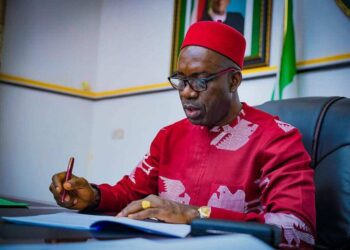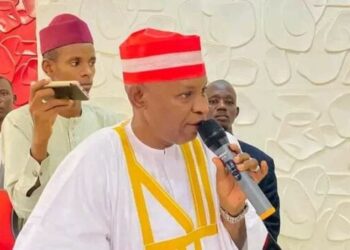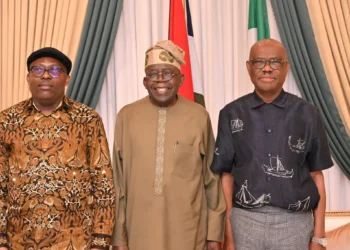The Nigerian Senate has given President Bola Tinubu the green light to borrow ₦1.15 trillion from the domestic debt market to finance the deficit in the 2025 national budget.
The upper legislative chamber granted the approval on Wednesday after reviewing and adopting a report submitted by the Senate Committee on Local and Foreign Debts, which is chaired by Senator Aliyu Wamakko representing Sokoto North on the platform of the All Progressives Congress.
The committee’s recommendations were presented to the plenary by its Vice Chairman, Senator Haruna Manu, a Peoples Democratic Party lawmaker representing Taraba Central, who urged his colleagues to endorse the borrowing plan designed to bridge the funding gap in the current fiscal year.
“That the Senate do receive and consider the Report of the Committee on Local and Foreign Debts for the approval of the Borrowing Programme to Fund the 2025 Budget Deficit,” Senator Manu stated while laying the report before the chamber.
After extensive deliberation, senators adopted a motion supporting the proposed borrowing, expressing the view that the funds are essential for the implementation of critical government programmes and projects outlined in the 2025 budget.
President Tinubu’s formal request for the borrowing facility had been presented to the Senate on November 4, 2025, when Senate President Godswill Akpabio read the presidential letter during plenary session.
In his communication to the National Assembly, Tinubu explained that the ₦1.15 trillion would be sourced entirely from domestic lenders and deployed to close the budget deficit while ensuring continuity in government operations throughout the fiscal year.
“The proposed borrowing is intended to bridge the funding gap and ensure full implementation of government programmes and projects under the 2025 fiscal plan,” the President wrote in his letter seeking legislative consent.
Following the initial reading of the request, Akpabio had immediately referred the matter to Senator Wamakko’s committee, directing the panel to conduct a thorough review and submit its findings and recommendations to the Senate within one week to enable prompt legislative action.
The committee met the deadline, examining the rationale for the borrowing, its potential impact on Nigeria’s debt profile, and the government’s capacity to service the additional obligation before recommending approval to the full Senate.
The approval adds ₦1.15 trillion to Nigeria’s domestic debt stock, which has been rising steadily as successive administrations resort to borrowing to finance budget deficits arising from the gap between projected revenues and planned expenditures.
Domestic borrowing, which involves issuing government bonds and treasury bills purchased by Nigerian banks, pension funds, and other institutional investors, has become the preferred option for financing deficits as it avoids the exchange rate risks associated with foreign loans.
However, critics of the government’s borrowing strategy have expressed concern that Nigeria’s growing debt service obligations are consuming an increasingly large portion of federal revenue, leaving less money available for capital projects and essential services.
Recent data from the Debt Management Office shows that debt service payments have been eating up a significant percentage of government revenue, raising questions about the sustainability of Nigeria’s fiscal position if borrowing continues at the current pace.
Proponents of the borrowing argue that deficit financing is a standard practice in modern economies and that as long as borrowed funds are invested in productive projects that generate economic growth, the debt burden remains manageable.
The 2025 budget, which the borrowing is meant to support, was based on certain revenue assumptions including projected income from oil sales, taxes, and other sources. When actual revenue collection falls short of these projections, the government must either cut spending or borrow to maintain planned expenditure levels.
By opting to borrow rather than implement spending cuts, the Tinubu administration has signaled its determination to proceed with its policy agenda and project implementations as outlined in the budget, despite revenue challenges.
The Senate’s swift approval of the borrowing request, coming just over a week after it was submitted, demonstrates legislative support for the government’s fiscal strategy and a willingness to provide the executive branch with the financial tools needed to govern.
With the Senate having granted approval, the President can now proceed to access the ₦1.15 trillion from the domestic debt market through the issuance of government securities, which will be purchased by investors seeking safe, government-backed returns on their capital.
















